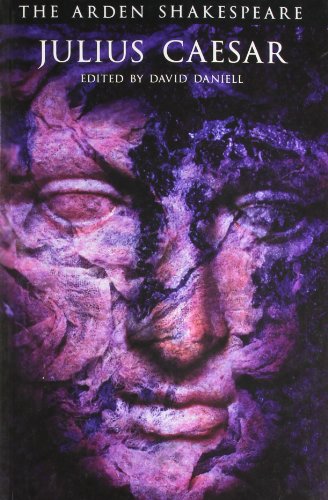Julius Caesar
Third Series
William Shakespeare
BOOK REVIEW

Julius Caesar: Third Series bursts forth from the pages of history, a timeless reflection of ambition, betrayal, and the tumultuous dance of power that reverberates even today. Shakespeare's vibrant portrayal of these themes invites readers to traverse the treacherous terrain of human nature, where loyalty is rendered fragile, and ideals can twist into weapons against those we once revered.
In this breathtaking tragedy, we are thrust into the heart of the Roman Republic, a society on the brink of chaos, rife with political intrigue. Julius Caesar, the ambitious leader who has captivated the masses, is struck down by those closest to him. But this is not merely a historical retelling; it's a mirror held up to our present, echoing questions of leadership, morality, and the cost of power. The assassination of Caesar is the fulcrum of the play, stirring the pot of political discourse as we witness the motivations of the conspirators - Brutus, Cassius, and their cohort, wrestling with the fine line between loyalty to a friend and duty to their nation. Their identities and values are tested as the fallout unfolds with catastrophic intensity.
Readers from all walks of life have reacted strongly to this work. Some are captivated by its poetic language, finding beauty in the intricate interplay of words, while others grapple with the moral quandaries presented. A common thread among modern critiques highlights how Caesar's ambition ultimately leads not only to his demise but also to the ruin of Rome itself. It ignites a powerful conversation about the contemporary relevance of leadership ethics; how far are we willing to go to defend our ideals?
Among the fiery commentary, some readers are notably drawn to Shakespeare's character development. Brutus emerges as a tragic hero, caught in a web of his own making. His internal struggle and philosophical convictions resonate with a modern audience, leading to a poignant reflection on trust and the human condition. However, critics argue that Shakespeare's depiction of female characters is somewhat limited. The strong yet sidelined Portia, a voice of reason in a tumultuous world, leaves a longing for more depth, a fact that has sparked modern interpretations pushing for nuanced portrayals.
Yet what truly makes Julius Caesar: Third Series a gripping read is the sheer emotional weight it carries. The eulogies and responses to Caesar's death encapsulate the profound grief and chaos that ensue-remnants of lost potential and shattered alliances. We cannot help but feel the pulse of the crowd as Mark Antony rallies them with his masterful oration, igniting a revolution and shifting allegiances. The powerful imagery, intensified through Shakespeare's commanding iambic pentameter, dances off the page, pulling you into the chaos where every betrayal feels visceral, every triumph hollows out the spirit.
As we dig deeper, it's impossible to ignore the historical currents that shaped Shakespeare's narratives. Written during the late 16th century, the play reflects the turbulence of Elizabethan politics, mirroring the fears and aspirations of a society grappling with questions of authority and governance. It stands as both a historical artifact and a salient warning against the cyclical nature of tyranny and revolution. The resonance of these themes transcends time, existing as a stark reminder of the fragility of democracy-a topic passionately debated in our current landscape.
In a world where narratives are carefully constructed, Shakespeare's raw, unflinching exploration of betrayal invites us to confront uncomfortable truths about our leaders and ourselves. It compels us to grapple with our own moral compasses and the consequences of our actions; the revelations linger long after you turn the final page.
Ultimately, Julius Caesar is not just a tale of ancient Rome; it's a compelling journey through humanity's darkest fears and brightest dreams, evoking a profound sense of urgency and introspection. Whether you find yourself rooting for Brutus, questioning the motives of Cassius, or mourning the fallen Caesar, this tragedy will leave an imprint on your psyche. It beckons you to reflect deeply, ensuring that you'll never look at ambition and power in quite the same way again. 🌌
📖 Julius Caesar: Third Series
✍ by William Shakespeare
🧾 416 pages
2012
#julius #caesar #third #series #william #shakespeare #WilliamShakespeare